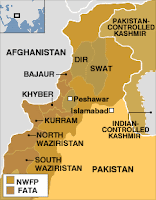 Last week I wrote about the US’s military’s use of unmanned drones to carry out air strikes in Pakistan. The air strikes have caused an increase of anti-Americanism in Pakistan, and I suggested that President Obama work with Pakistani authorities rather than ignore them. Amazingly, he has done just that—today, Obama agreed to consult Pakistani military leaders before performing air strikes in the country. With any luck, this should prevent more anti-Americanism from forming in the region by making the US seem more benevolent and cooperative. However, this is not the only thing I would like to talk about today—the White House has just released their new Afghanistan/Pakistan strategies, and I would like to discuss these.
Last week I wrote about the US’s military’s use of unmanned drones to carry out air strikes in Pakistan. The air strikes have caused an increase of anti-Americanism in Pakistan, and I suggested that President Obama work with Pakistani authorities rather than ignore them. Amazingly, he has done just that—today, Obama agreed to consult Pakistani military leaders before performing air strikes in the country. With any luck, this should prevent more anti-Americanism from forming in the region by making the US seem more benevolent and cooperative. However, this is not the only thing I would like to talk about today—the White House has just released their new Afghanistan/Pakistan strategies, and I would like to discuss these. The main theme seems to be combining the plans for Pakistan and the plans for Afghanistan into a “coherent whole.” Obama is making it very clear that the war will continue, but the way we handle it will change. This is not a “surge,” but an ongoing effort to pursue Al-Queda and put Afghani and Pakistani security forces in control of the situation. It will require more US troops to be sent overseas, but there is a clear exist strategy in mind: subdue the terrorists to the point where the local authorities can take over. There is clearly far more emphasis on reconstruction compared to the Bush Doctrine—as I understand it, the original plans for the Iraq War assumed that the Iraqis could rebuilt their country in 6 months.
The report also calls for more cooperation between US agencies and organizations in order to form a more concrete strategy. I believe that this is the most important point, since it is lack of communication that made the war in Iraq such a disaster. The US was woefully unprepared for the kind of war it was fighting, and there was no clearly defined exit strategy. If we can get the various branches of the military to communicate with each other and with other agencies (such as the CIA, FBI, NSA, etc.) I believe we will be fighting far more effectively. I am particularly concerned with the NSA—I suspect they have a gold mine of information about terrorist cells that the operational branches of the military have not tapped into yet.
It is also clear that the US is going to call on other, non-NATO nations, such as China and Russia, to help out (or at least not oppose) with the war effort. I doubt this part of the report will have any significance—though Obama has a better repertoire with other heads of state than Bush did, I doubt he will be able to convince nations to commit themselves to a war means very little to them.
Overall, will this strategy work? I think it might, but not as perfectly as Obama hopes. I believe his policy of better communication and will work far better than Bush’s “War on Terror,” which was ignorant of the fact that the nations the US is invading are not happy about the fact that their homeland is being meddled with. However, I don’t think that this new policy will destroy Al-Queda or the Taliban completely. It is almost impossible to completely snub radicalism in the Middle East, and it is going to take at least several years for local security forces to be able to handle this fight themselves. Additionally, Al-Queda is a worldwide organization—though we are eliminating some of their cells and cutting off their influence in two major Arab nations, we are not destroying the organization entirely. Sadly, in order to do so a much more interventionist policy is needed, one that would undoubtedly have the world spite the United States.
 China seems to be all over the news lately, and over the past few weeks I have written several posts about current events relating to the PRC. Today I am going to add one more, because the story in question is particularly interesting. This morning researchers in the University of Toronto discovered an electronic spying network called GhostNet, which had “infiltrated at least 1,295 computers in 103 countries.” The network appeared to be based in China, and most of the nations infiltrated are located in East Asia. The spy network targeted politicians and companies these nations. Here is an incomplete list of some of the notable nations who were hacked: Iran, Bangladesh, Latvia, Indonesia, Philippines, Brunei, Barbados, Bhutan, India, South Korea, Indonesia, Romania, Cyprus, Malta, Thailand, Taiwan, Portugal, Germany and Pakistan. There was also evidence that one of GhostNet’s targets was the Dali Lama, since various private documents of his were found on the network.
China seems to be all over the news lately, and over the past few weeks I have written several posts about current events relating to the PRC. Today I am going to add one more, because the story in question is particularly interesting. This morning researchers in the University of Toronto discovered an electronic spying network called GhostNet, which had “infiltrated at least 1,295 computers in 103 countries.” The network appeared to be based in China, and most of the nations infiltrated are located in East Asia. The spy network targeted politicians and companies these nations. Here is an incomplete list of some of the notable nations who were hacked: Iran, Bangladesh, Latvia, Indonesia, Philippines, Brunei, Barbados, Bhutan, India, South Korea, Indonesia, Romania, Cyprus, Malta, Thailand, Taiwan, Portugal, Germany and Pakistan. There was also evidence that one of GhostNet’s targets was the Dali Lama, since various private documents of his were found on the network.


 I’ve said it many times before: the crisis that will come determine the survival of the human race is the overpopulation crisis. The Earth has a finite “carrying capacity,” which we are coming closer and closer to with each passing day. Experts predict that in 2030 the world population will be 8.3 billion, and we are going to see serious shortages of food, water, and energy. Unless we can somehow manage to figure out how to more efficiently manage our resources or find more efficient ways of obtaining the resources we need, these shortages may result in complete economic and social collapse, possibly even the death of our race. What scares me (and many other people) most is the fact that 2030, when we will really have to face this crisis, is only 20 years away
I’ve said it many times before: the crisis that will come determine the survival of the human race is the overpopulation crisis. The Earth has a finite “carrying capacity,” which we are coming closer and closer to with each passing day. Experts predict that in 2030 the world population will be 8.3 billion, and we are going to see serious shortages of food, water, and energy. Unless we can somehow manage to figure out how to more efficiently manage our resources or find more efficient ways of obtaining the resources we need, these shortages may result in complete economic and social collapse, possibly even the death of our race. What scares me (and many other people) most is the fact that 2030, when we will really have to face this crisis, is only 20 years away
 I’d like to take today off from my usual philosophical and political topics to discuss some short stories I have read recently.
I’d like to take today off from my usual philosophical and political topics to discuss some short stories I have read recently.

 As President Obama has said several times, in order to win the war on terror we must focus our attention on Pakistan. Osama Bin Laden is supposedly hiding in mountain caves in the northern region of the country, and Taliban and Al-Qaeda are reportedly active in Pakistan as well. Obama has stated that we must strengthen negotiations with the Pakistani government in order to more effectively hunt the Taliban hiding in the north, which is an admirable—if a bit impractical—goal. But US policies in the region threaten to undermine, policies that Obama is doing nothing to change. If he continues to do nothing, I fear that sooner or later both the government and people of Pakistan develop some strong anti-US sentiment.
As President Obama has said several times, in order to win the war on terror we must focus our attention on Pakistan. Osama Bin Laden is supposedly hiding in mountain caves in the northern region of the country, and Taliban and Al-Qaeda are reportedly active in Pakistan as well. Obama has stated that we must strengthen negotiations with the Pakistani government in order to more effectively hunt the Taliban hiding in the north, which is an admirable—if a bit impractical—goal. But US policies in the region threaten to undermine, policies that Obama is doing nothing to change. If he continues to do nothing, I fear that sooner or later both the government and people of Pakistan develop some strong anti-US sentiment.
 It’s official: the series on justice systems is now the longest on this blog, even longer than
It’s official: the series on justice systems is now the longest on this blog, even longer than 
 The series on justice systems is back with a vengeance (pun intended). Today I would like to discuss a justice system that combines a utilitarian rehabilitation system and Heinlein’s “Coventry” (exile) system, which I talked about a few months ago in “Law and order” parts 1-5.
The series on justice systems is back with a vengeance (pun intended). Today I would like to discuss a justice system that combines a utilitarian rehabilitation system and Heinlein’s “Coventry” (exile) system, which I talked about a few months ago in “Law and order” parts 1-5. I can honestly say I have never seen Jon Stewart angry before. The hilarious host of Comedy Central’s “fake news” program The Daily Show
I can honestly say I have never seen Jon Stewart angry before. The hilarious host of Comedy Central’s “fake news” program The Daily Show


 To celebrate this post being the 100th ever published on this blog, I would like to spend today’s semi-humorous discussion talking about numbers. An interesting BBC article piqued my interest on a number-related subject, and I would like to share what I read. I am pleased to report that “trillion” has surpassed “billion” as the really big number that people have a hard time grasping. One trillion, also known as a million millions, was once a number only astronomers used. But today we find ourselves using it more than ever, and not usually in positive ways: take the US national debt, for example: $11,000,000,000,000. Or the national deficit: $1,750,000,000,000. And remember when “millionaire” signified a person with unlimited riches? It turns out that there are over 10 million millionaires in the world today, making the term somewhat obsolete.
To celebrate this post being the 100th ever published on this blog, I would like to spend today’s semi-humorous discussion talking about numbers. An interesting BBC article piqued my interest on a number-related subject, and I would like to share what I read. I am pleased to report that “trillion” has surpassed “billion” as the really big number that people have a hard time grasping. One trillion, also known as a million millions, was once a number only astronomers used. But today we find ourselves using it more than ever, and not usually in positive ways: take the US national debt, for example: $11,000,000,000,000. Or the national deficit: $1,750,000,000,000. And remember when “millionaire” signified a person with unlimited riches? It turns out that there are over 10 million millionaires in the world today, making the term somewhat obsolete..png) Previously I discussed China being a threat to democracy because it refuses to address human rights issues and set a good example for the nations around it. But because of the economic crisis, shifting populations and some current events, China’s authoritarian threat is even greater than ever.
Previously I discussed China being a threat to democracy because it refuses to address human rights issues and set a good example for the nations around it. But because of the economic crisis, shifting populations and some current events, China’s authoritarian threat is even greater than ever.
 No, I’m not suggesting that the US government is fascist. But I would like to speculate on what it would take for the US to lapse into fascism. Though I am not concerned it will happen, I think it would be interesting to discuss.
No, I’m not suggesting that the US government is fascist. But I would like to speculate on what it would take for the US to lapse into fascism. Though I am not concerned it will happen, I think it would be interesting to discuss.
 Americans are quick to point to Russia and China as examples of why communism and socialism cannot function on a large scale. However, I believe that Russia and China are not qualified to be considered case studies for communism, for reasons I shall explain.
Americans are quick to point to Russia and China as examples of why communism and socialism cannot function on a large scale. However, I believe that Russia and China are not qualified to be considered case studies for communism, for reasons I shall explain.
 In today’s second post, I am going to briefly discuss the International Criminal Court’s arrest warrant for Omar al-Bashir, the President of Sudan.
In today’s second post, I am going to briefly discuss the International Criminal Court’s arrest warrant for Omar al-Bashir, the President of Sudan.
 Though I’ve talked about it
Though I’ve talked about it  Ironic as it may sound, American conservatism has changed a great deal, and today it is radically different from its American Revolution-era predecessors. Originally, conservatism was very Jeffersonian: it stressed small government, agrarian societies, and social libertarianism. Though it had its roots in Christianity, American conservatism did not include any kind of moral reform or social control. Today, though, conservatism has gone in the opposite direction: today’s conservative leaders advocate Amendments to the Constitution (or laws that could be interpreted as violations thereof) to promote Christian influence and enforce moral rules as law. In other words: the movement has taken on a repressive, moralistic edge that is the complete antithesis of its libertarian beginnings. Don’t believe me? Look at today’s conservative leaders. For example, leading conservative commentators Rush Limbagh and Sean Hannity both preach excessive social control and religious influence in lawmaking. Former Vice Presidential candidate Sarah Palin, seen as a role model for neoconservatives, was famous for her rejection of Roe v. Wade, support of school prayer, and overpowering emphasis on the traditional family structure.
Ironic as it may sound, American conservatism has changed a great deal, and today it is radically different from its American Revolution-era predecessors. Originally, conservatism was very Jeffersonian: it stressed small government, agrarian societies, and social libertarianism. Though it had its roots in Christianity, American conservatism did not include any kind of moral reform or social control. Today, though, conservatism has gone in the opposite direction: today’s conservative leaders advocate Amendments to the Constitution (or laws that could be interpreted as violations thereof) to promote Christian influence and enforce moral rules as law. In other words: the movement has taken on a repressive, moralistic edge that is the complete antithesis of its libertarian beginnings. Don’t believe me? Look at today’s conservative leaders. For example, leading conservative commentators Rush Limbagh and Sean Hannity both preach excessive social control and religious influence in lawmaking. Former Vice Presidential candidate Sarah Palin, seen as a role model for neoconservatives, was famous for her rejection of Roe v. Wade, support of school prayer, and overpowering emphasis on the traditional family structure.

